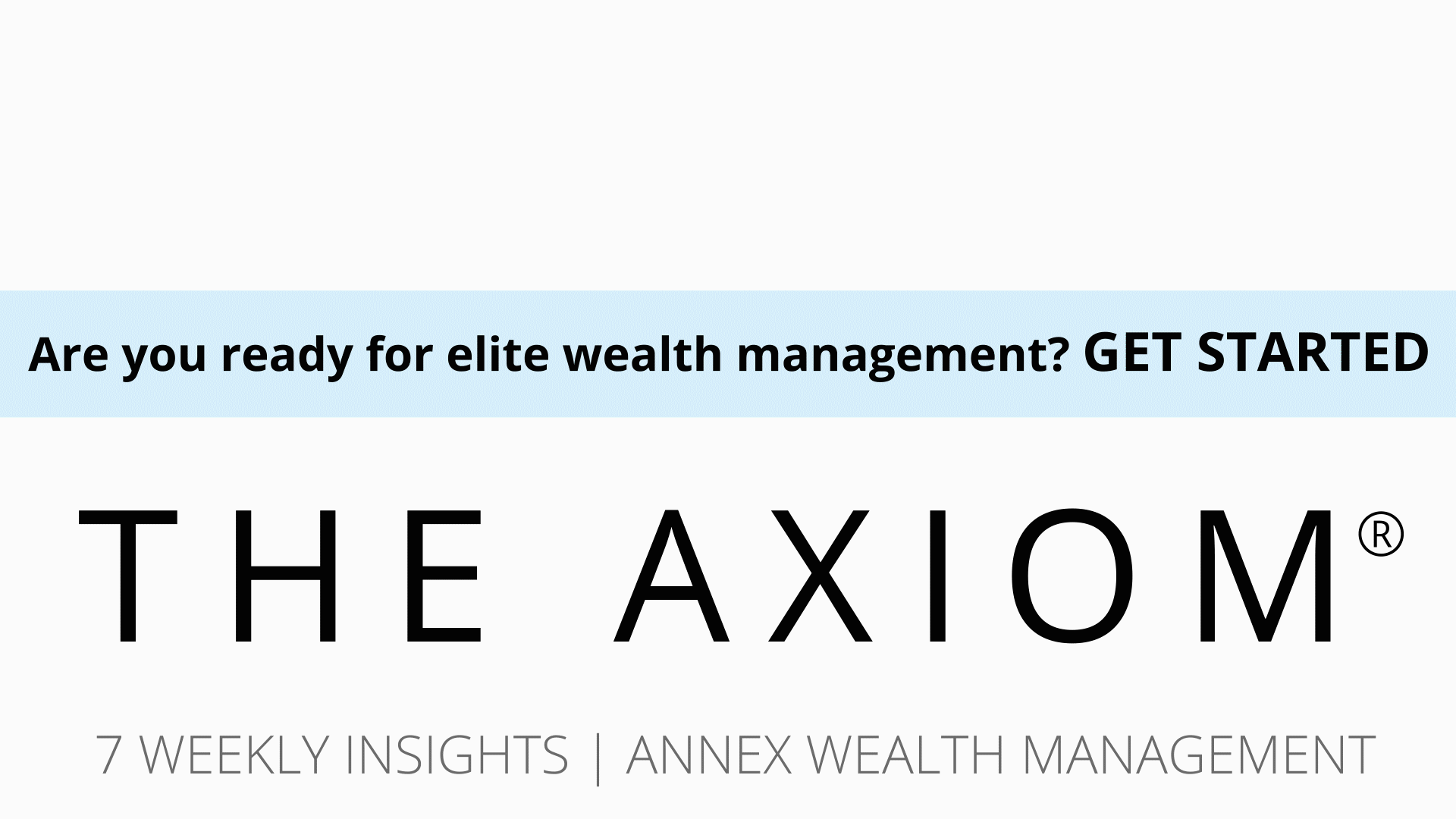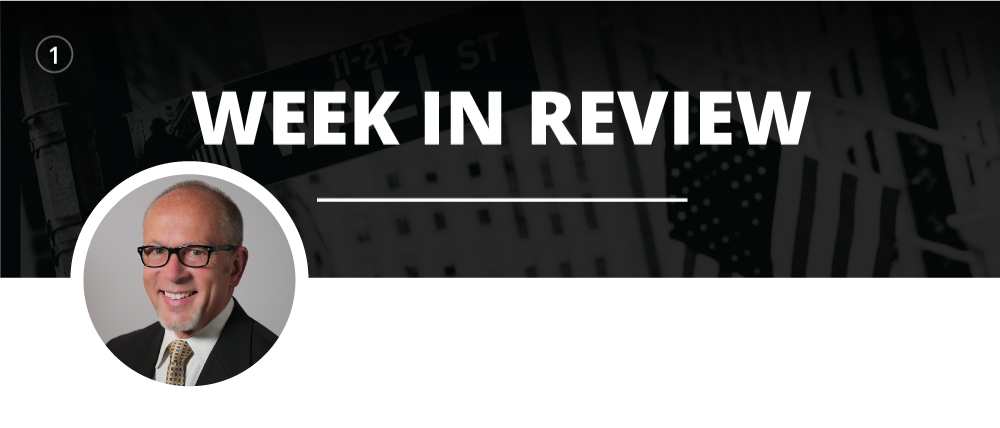
Axiom | Vol 268
World Events, Stocks Showing Volatility, & Delta Are Top Of Mind

Meet The Axiom®’s Guest Editor: David G. Batten, CFP®, CIMA®, CRPS®
I’m David Batten, one of the Wealth Managers here at Annex Wealth Management.
In my role with the firm, I have the pleasure of working directly with some of our clients to hear & understand what is meaningful to them and help them make well-informed financial choices as they go through life. Helping the individuals and families I have the honor to work with make impactful decisions in their lives is the most rewarding part of my work. None of us know how life will unfold but having the financial flexibility to roll with the changes certainly can help take some of the stress away and hopefully make the journey more enjoyable.
As recent empty nesters, my wife and I are enjoying a new phase of our life together, finding lots of adventures to experience and learn from.
BACK TO TOP ↑

“From my perspective, the Axiom is a terrific way to not just be updated on what happened in the investment markets during the past week, but also to learn more about important topics that we should all give some thought to from time to time. Annex Wealth Management’s commitment to being a clear & credible source of insight & knowledge is on full display each week with the Axiom.”
– Guest Editor: David G. Batten, CFP®, CIMA®, CRPS® | Wealth Manager
________________________________________
World Events, Stocks Showing Volatility, & Delta Are Top Of Mind
Even after a good week in the markets, investors continue to be concerned about Delta, world events of the past week cause concern, and the upcoming discussions involving potential tapering by the Fed are on the horizon. Annex Wealth Management’s Dave Spano and Derek Felske discuss the great end of the summer earning season and the upcoming Federal Reserve meetings and what the results could mean.
BACK TO TOP ↑

It’s a good rule of thumb to review your will every four to five years, even if you don’t think anything is different. This helps ensure your family stays protected and your final wishes are respected.
Poll: Have you updated your will recently?
BACK TO TOP ↑

Know What You Own: Alternatives
Throughout the year, we’ve been encouraging you to know what you own – beyond the name of the investment, to what type of investment, what’s in it, and how it affects your portfolio, and ultimately, your financial plan.
In this edition of Moneydo’s “Know What You Own” series, we ask you to take a look at your Alternative Investments.
Alternative investments is a catch-all category that doesn’t fall into one of the conventional asset classes like a stock or a bond. An Alternate Investment might be currency, hedge funds, private equity, collectibles, commodities, or real estate.
You might notice when studying the many types of alternative investments that you probably don’t have those sorts of investments in your portfolio. Here’s why this might be the case:
Currencies – which include cryptocurrencies like Bitcoin – are very hard to analyze and typically are held by professional traders speculating on currency moves. Another entity that may hold a currency investment is a large bank or global company hedging against currency risk.
Hedge funds grab headlines – and the imaginations of Hollywood: there’s even a television series about a diabolical hedge fund manager. But hedge funds are generally not held by the majority of investors. Hedge funds build reputation by being exclusive, and are often only available to those who have a certain level of net worth or annual income. For the vast majority of investors, investing in a hedge fund or in a private equity fund are just not going to be an option.
Collectibles would include sports cards, vintage cars, wine, exclusive liquor, or art. Recently, the internet has made it possible for actual collectible exchanges, like Liv-ex and Bourbon-ex. Still, public trading of collectibles isn’t widely-used. Instead, many collectibles exchange hands through private auctions.
Collectible values go up or down based on the uniqueness of the item and the demand based on who might be at the auction. Perhaps more than other investments, the economy tends to play a large part in the willingness of high net worth investors to spend on high value items collectibles.
If you do hold Alternative Investments in your portfolio, it’s likely one of two types:
Real Estate or Commodities. Real Estate includes anything from direct ownership of your residence, to a rental property where you’re the landlord and rent out to a tenant, to a real estate investment trust (REITs) in which there is professional management running many properties for you. REITs are structured as partnerships and can invest in anything from data centers, cell phone towers, strip malls, hospitals, apartment buildings, and hotels.
Typically, REITS are structured to pass along income to their shareholders at a rate of greater than 90% of profits. Investors turn to them for exposure to real estate without having to personally manage property.
Commodities include things like energy, metals, agriculture, and livestock. Most investors recognize the two most popular commodities: gold and oil. Many investment sites and channels will display the movement of gold and oil as bellwethers for the direction of the economy.
The change in oil prices, for example, has the ability to change our day to day lives as gas combustion moves our vehicles. But oil prices can also add to production and delivery costs for major corporations, impacting the bottom line.
Oil prices can even go negative! Last year, when everyone was stuck at home, the lack of demand caused the price to go below 0. Because of the cost of storing oil, traders were willing to pay someone else to take oil from them, because they did not want to be stuck with having to store it.
Gold and other precious metals are usually held for one of two reasons:
Some investors hold them as an inflation hedge. Historically, as inflation has risen, so does gold.
Another common reason to hold a precious metal is as an insurance policy for a recession or economic depression. Many people flocked to gold in 2008-9 in the depths of the great recession or in the midst of the lockdown, when fears were at their highest due to the virus.
If you’re considering investing in alternative investments, one path you could consider is instead of buying them yourself, invest in companies that work specifically with those commodities. One good example of this strategy would be if you think that oil prices are going up, to buy an energy company, or if you think gold is going up, invest in a company that mines gold or provides mining equipment.
One danger of Alternative Investments is that they may seem more personal or more “fun” than a “traditional” investment. But Alternative Investments require the same degree of careful planning and scrutiny as any other investments. Your planning and retirement goals remain the same, regardless of what investment you’re employing to get there.
If you’d like help or insight on planning or how to manage your alternative investments, find an advisor you can trust who isn’t going to give you a list of products to buy. Head to our website and click on the ‘Get Started’ button to learn more about how Annex Wealth Management can help.
BACK TO TOP ↑

This week’s Ask Annex comes from Sue, who asks:
“Is Market Volatility A Result Of Fed & Policy Changes?”
___________________________
We asked Annex Wealth Management’s Todd Voit, PhD:
Your question correctly refers to “changes” in Fed and policy, which could explain some of the volatility in the market, but these have more long-term effects on market volatility. Anticipation of Fed policy changes probably more correctly explains short-term effects on market volatility.
Another important stimulus for volatility: economic surprises. What I mean by that is every day, economic data is reported. Many investors pay attention to three groups of data:
1. Actual data
2. Consensus (or expectations)
3. Prior data
Economists review these data to calibrate their estimates and determine implications on where the economy will be over the next 6 to 12 months. They also try analyze and see if there’s a discernable economic or market trend.
Surprises occur when actual data disagrees with perceived trends or future predictions. For example, economists will study corporate profits, which tend to be a link between the economy and markets. The question investors seek to answer is what effect new information will have on corporate profits in the future.
– Todd Voit, PhD
BACK TO TOP ↑

Does Your Advisor Help You Maintain An Effective & Updated Estate Plan?
Not keeping beneficiaries current can be a costly mistake. Annex Wealth Management’s Estate Planning Attorney, Jill Martin, JD, explains why proper beneficiary designations are a critical component to your estate plan.
BACK TO TOP ↑


KNOW THE DIFFERENCE MINUTE:
Will In-Flight Alcohol Sales Soon Be A Thing Of The Past?
KNOW THE DIFFERENCE MINUTE:
American Household Debt At Highest Number In 14 Years
WHAT’S THAT?
What’s a Mega Backdoor Roth? | Mega Backdoor Roth definition
BACK TO TOP ↑

Annex Wealth Management provides free workshops, open to the public, on key wealth management topics.
Each week, we provide links to register for upcoming events.
BACK TO TOP ↑